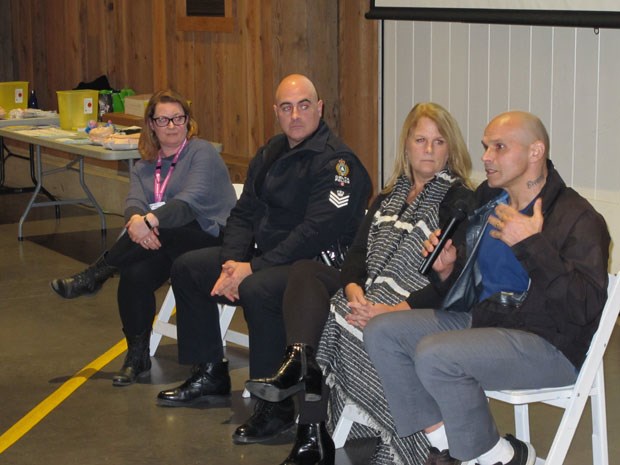It was a real talk with a real message.
Delta Real Talk held an evening of dialogue on the overdose crisis and naloxone training at Harris Barn in Ladner Wednesday night.
The evening, heldin partnership with the Delta Community Action Table on Overdose Response and funded by Fraser Health, featured a panel discussion that included Guy Felicella a former addict turned advocate, Julie Cochrane, an advocate from Momstoptheharm, public health nurse Kim Ghilarducci and Delta police officer Ryan Hall.
The panelists shared real-life stories and experiences about how the overdose crisis continues to take lives from our communities.
According to statistics shown during the opening portion of the forum, 72 per cent of overdoses in B.C. are happening in private residences, and four out of five victims are men. The overdose crisis has taken lawyers, doctors, teachers, moms, dads, siblings and is not just a problem amongst those who are down on their luck, homeless or who have fallen on hard times.
“People often think this is something happening on the streets and it definitely is, but we are looking at people dying who are using in their homes,” said Ghilarducci. “This is a crisis that is everywhere and affects us all.”
Felicella shared his story of addiction, relapse and how he ended up on Vancouver’s Downtown Eastside. He now has a loving family and has made it his mission to work with communities and governments to find ways to overcome the drug crisis.
“We didn’t start this drug crisis, but we can change that,” he said. “I have two beautiful kids and I don’t want to leave this with them. We need to end the stigma around this and realize that this is not a Downtown Eastside problem, it’s a problem in all our communities. It’s a problem in Delta, Tsawwassen and Ladner.”
Cochrane shared the story of losing her stepson to a drug addiction and her family’s struggle to cope with the loss.
Arianna Wingfield, project coordinator for the Delta Community Action Table on Overdose Response, said the event and one held in September in North Delta are intended to start the dialogue about substance use and to get vital information into the hands of community members.
“This crisis is complex, layered and by no means do we think one event will solve everything. However, it’s all about starting the conversation,” she said. “We acknowledge that everyone walking into the room comes with different experience with this topic – and we love when there is open dialogue from different perspectives – that’s how we learn, and connect. We need to work together for this crisis to end.
“I was pleased that people were willing to share their experiences last night. If one person showed up and was able to feel more educated about the event, then we are happy. Others sharing that they use substances and have felt hidden for years, and felt dignified last night, so for us, that is a huge success.”
She said more events are planned, including one on Dec. 7, which will be geared to parents/caregivers who want to learn how to dialogue with their child/teen about substance use.
“We will have parents with lived experience and counsellors speaking to the topic,” said Wingfield. “We will also have practical skills and time for practice.”
She said finding ways to end the overdose crisis can be as simple as keeping the conversation going.
“Talk to your family and friends, just start the dialogue,” she said.
For more information on upcoming forums or the two that already took place, email Wingfield at: ariannaw@deltassist.com.



